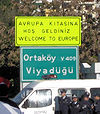Portal:Linguistics/Featured article/November 2010
Turkish is a language spoken by 65–73 million people worldwide, predominantly in Turkey, with smaller communities of speakers in Cyprus, Greece and Eastern Europe, as well as by several million immigrants in Western Europe, making it the most widely spoken of the Turkic languages. The roots of the language can be traced to Central Asia, with the first written records dating back nearly 1,200 years. To the west, the influence of Ottoman Turkish—the immediate precursor of today's Turkish—spread as the Ottoman Empire expanded. In 1928, as one of Atatürk's reforms in the early years of the new Turkish Republic, the Ottoman script was replaced with a phonetic variant of the Latin alphabet. Concurrently, the newly founded Turkish Language Association initiated a drive to reform the language by removing Persian and Arabic loanwords in favor of native variants and coinages from Turkic roots. The distinctive characteristics of Turkish are vowel harmony and extensive agglutination. The basic word order of Turkish is subject–object–verb. Turkish has a T–V distinction: second-person plural forms can be used for individuals as a sign of respect. Turkish also has no noun classes or grammatical gender. (more...)

